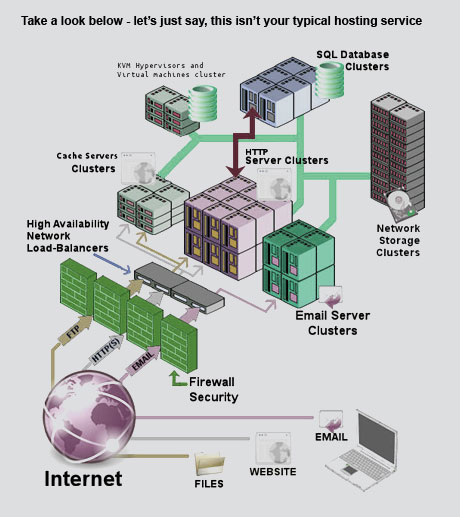
Cluster Load Balancing & High Availability
A cluster refers to two or more computers, setup to work together as one system.
If there is a breakdown in the cluster, the available resources are redirected towards the working machines and the work load is redistributed.
If one of the machines physically stops functioning, a special process, known as failover, automatically redirects the queries to another machine that is fully functional.
The clustering strategy consists of three main components:
Server Clustering - provides high reliability of applications and services which require protection from breakdowns, as well as expandability and productivity.
Clustering allows organizations to distribute their applications and information resources over a large number of servers, joined together in a cluster configuration.
Applications and services such as the ones provided by:
database servers;web servers;file servers;mail servers;audio and video streaming servers;
and other specialized applications are perfect candidates for Server Clustering.
Network Load Balancing (NLB) – ensures increased productivity when working with network resources and reliability in case of breakdowns in IP-based applications and services.
NLB allows organizations to create groups of clustered machines which can balance the load from TCP (Transmission Control Protocol), UDP (User Datagram Protocol)
and GRE (Generic Routing Encapsulation) network queries. Front-end services are a perfect candidate for this type of component.
Types of clusters from the point of view of organization:
Cluster Farm - a group of several servers, providing similar services, but not sharing data.
They are known as “farms”, because they handle all queries received, using identical copies of locally stored data.
Every machine can handle virtually every query and the data is replicated. The “farm” members work autonomously, which is why the are also known as “branches”.
Cluster Pack – a group of servers working together and sharing a common information resource (usually a common disk file subsystem).
Since the members have shared access to the data, the system has a special operation mode when it comes to working with files,
it allows processes on different machines to operate with one and the same information resource at the same time.
 |

|
|
|
 |
 |
 |
 |
 |
 |
 |
 |
|

5 Hristo Smirnenski str.
Bankia 1320
Bulgaria
Telephone number: 070044166
Cell: +359899831749
+359899837149
E-mail:
For information about the services we offer, please write to info@gesbg.com
For technical assistance of any kind, please write to support@gesbg.com
For questions about payment(s), please write to billing@gesbg.com
|
|

|
|
|
|






















